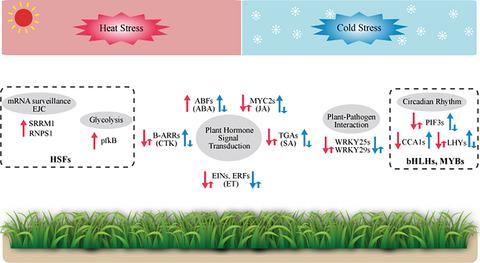当前位置:
X-MOL 学术
›
Plant Biol.
›
论文详情
Our official English website, www.x-mol.net, welcomes your
feedback! (Note: you will need to create a separate account there.)
The transcription factors of tall fescue in response to temperature stress
Plant Biology ( IF 4.2 ) Pub Date : 2020-10-20 , DOI: 10.1111/plb.13201 X.Y. Li 1, 2 , Y. Wang 1, 3 , Y. Dai 1, 2 , Y. He 1, 2 , C.X. Li 1, 3 , P. Mao 1 , X.R. Ma 1, 2, 3
中文翻译:

高羊茅对温度胁迫的转录因子
更新日期:2020-12-14
Plant Biology ( IF 4.2 ) Pub Date : 2020-10-20 , DOI: 10.1111/plb.13201 X.Y. Li 1, 2 , Y. Wang 1, 3 , Y. Dai 1, 2 , Y. He 1, 2 , C.X. Li 1, 3 , P. Mao 1 , X.R. Ma 1, 2, 3
Affiliation

|
- Tall fescue (Festuca arundinacea) is an important grass species worldwide, but temperature stress severely affects its distribution and yield. Transcription factors (TFs), as the master switches in sophisticated regulatory networks, play essential roles in plant growth development and abiotic stress responses.
- In this study, the comparative transcriptome analysis was performed to explore the commonalities and differences in the response of TFs to the heat (40 °C), cold (10 °C) and control (22 °C) conditions.
- A total of 877 TF genes belonging to 35 families were identified. Most of them (784) were differentially expressed genes (DEG), indicating TF genes actively responded to temperature stress. The expression of bZIP and GTF family members was up‐regulated when exposed to both heat and cold, but conversely, the expression of the most WRKY and NAC families members decreased. The HSF and GTE families and DREB2B were up‐regulated upon heat, while bHLH, MYB, HD‐ZIP and ERF families were elevated under cold stress. The TFs involved in ‘Plant hormone signal transduction’, ‘Plant‐pathogen interaction’, ‘Circadian rhythm’ play major roles in responding to temperature stresses.
- The results showed the temperature threats up‐regulated the expression of stress tolerance‐related genes, and down‐regulated those genes associated with growth and disease resistance, indicating TFs exert crucial roles in plant adaptation to an adverse environment. This study profiled the responsive pattern of TFs to temperature stresses, partially explained the mechanism of adaptations of cold‐season forage crops and screened many candidate stress‐tolerant TF genes.
中文翻译:

高羊茅对温度胁迫的转录因子
- 高羊茅(Festuca arundinacea)是世界范围内重要的草种,但温度胁迫严重影响其分布和产量。转录因子(TFs)作为复杂调控网络中的主要开关,在植物生长发育和非生物胁迫响应中起着至关重要的作用。
- 在这项研究中,进行了比较转录组分析,以探索TF对热(40°C),冷(10°C)和对照(22°C)条件的反应的共性和差异。
- 鉴定出总共属于35个科的877个TF基因。其中大多数(784)是差异表达基因(DEG),表明TF基因对温度胁迫有积极反应。当暴露于热和冷时,bZIP和GTF家族成员的表达上调,但相反,大多数WRKY和NAC家族成员的表达下降。HSF和GTE家族以及DREB2B在受热时上调,而bHLH,MYB,HD-ZIP和ERF家族在冷胁迫下升高。涉及“植物激素信号转导”,“植物与病原体的相互作用”,“昼夜节律”的TF在响应温度胁迫中起主要作用。
- 结果表明,温度威胁上调了与胁迫耐受性相关的基因的表达,而下调了与生长和抗病性相关的那些基因,表明TF在植物适应不利环境的过程中起着至关重要的作用。这项研究剖析了TF对温度胁迫的响应模式,部分解释了冷季饲草作物的适应机制,并筛选了许多候选的耐胁迫TF基因。











































 京公网安备 11010802027423号
京公网安备 11010802027423号